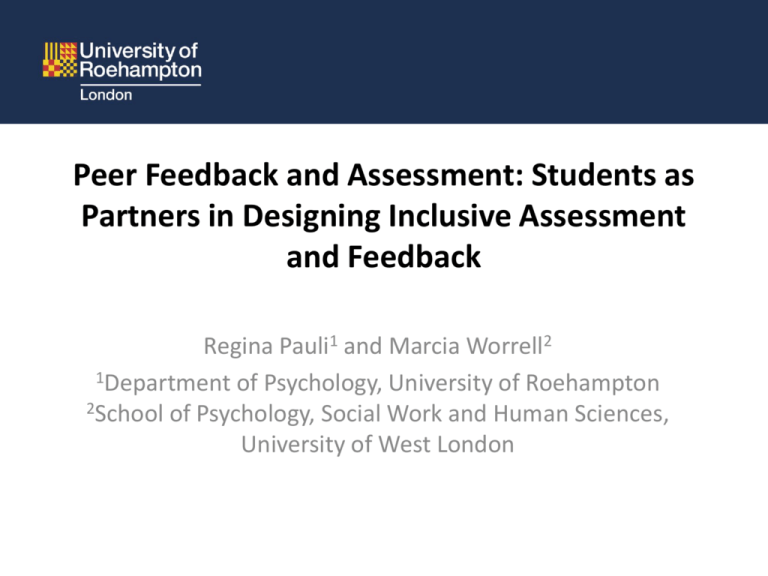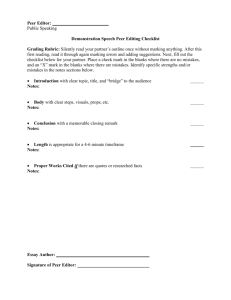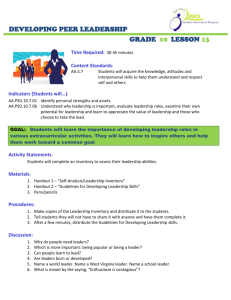Peer feedback and students as partners in assessment
advertisement

Peer Feedback and Assessment: Students as Partners in Designing Inclusive Assessment and Feedback Regina Pauli1 and Marcia Worrell2 1Department of Psychology, University of Roehampton 2School of Psychology, Social Work and Human Sciences, University of West London Sadler (2010): Beyond Feedback It is commonly assumed that the teacher’s responsibility for using assessment events to facilitate improvement in learning is fully discharged by providing extensive verbal communications relating to assessment task specification (and, arguably, fixed assessment criteria); information about the quality of an appraised work; and advice about how future responses to similar assessment tasks should be tackled. However, empirical evidence shows that whilst these communications may be appreciated by students, they often lead to little if any improvement in their subsequent work. (p. 548) An alternative approach Students as partners pedagogies • focus is on authenticity, personal relevance, practical applicability and personal development • student engagement and motivation through an acknowledgement of the self-determined nature of adult learning • intrinsic motivation and internalization of values and self-regulation leads to high quality learning as well as personal development (Deci et al, 1991) • characterized by inviting students to reflect on, coconstruct and participate actively in their own learning An alternative approach • Purposeful peer assessment as a pedagogical strategy • Task compliance • Quality • Criteria • Assessment for learning • Inclusivity = respect for individual learner • ‘zone of proximal development’ (Vygotsky, 1978) An alternative approach • Inclusivity of assessment • Close attention to individual learner needs • Some choice over assessment regime to capitalise on individual strengths • Empowering students to engage with feedback • Critical awareness of marking criteria • Active engagement with marking criteria • Control over learning through assessment • Self-evaluation through peer evaluation Case Study 1: Perspectives in Consciousness • • • • Year 2 module, 150+ students Assessment task: Portfolio of 8 x 400 words Patchwork type assessment Submission every two to three weeks but can be changed right up to final portfolio submission (end of March) • Two specific skills workshops – Understanding criteria and evaluating portfolio tasks – Making an argument/critical evaluation • Aims to foster critical reflection on own writing through a process of peer review – Facilitated in online forum in small groups Examples of student feedback Hi hun. I love the way you've written this piece and the language youve used. Couple of things you might like to know just so you dont lose maks though *Chalmers NOT Charmers *However Chalmers ALSO argued NOt . However Charmers argued, because you're already arguing his point. Hope this helps. I really think you did a good job on your portfolio, I have some similar points. Only one criticism: maybe summarise it a little bit more in depth at the end? what do you think? would be glad if you could comment on mine too. i like the way you have included references to show the controversy of whether animal consciousness exists. I also like the language you have used and the examples from the article. It may be an idea to relate the article more to the references you have used? overall though, really well thought out and shows you understand the points Case study 2: Criminal and Forensic Psychology • • • • Year 3 elective module 180 (+) students Assessed by a personal statement and case study analysis Diverse ways of engaging students with assessment criteria – In class debates – Group presentations on various aspects of the task and assessment criteria – Choice over which case study to analyse and how to approach it – TEL peer assessment/feedback Other experiences of peer assessment and feedback? Advantages? Disadvantages? Barriers • Staff • Trusting students to take some control • Lack of confidence in leading such activities (what if things go wrong?) • Lack of direct control may require spontaneous reaction • Students • Don’t trust peers to give adequate feedback • Recognise only staff as authority on assessment • Can’t be bothered to engage with a process that has no apparent direct benefit Challenges • Requires supportive learning environment • Trust needs to be established between students and tutors • Clear marking criteria (possibly negotiated) • Guidance on constructive feedback • Students who want to be ‘nice’ to their friends Risks • • • • • • Can get out of control Lack of trust Unfair decisions (peer marking) Academic standards Equivalence of grades Lurking (in online mediated peer feedback) Benefits • • • • • • • Psychological literacy Graduate skills – complex decision making Deeper student engagement Builds self-esteem and self-efficacy Identification with subject area and discipline Students as partners – breaks down barriers Draws out individual strengths






